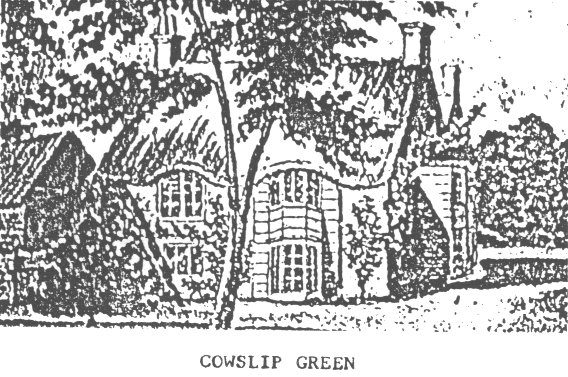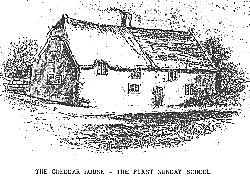|
COWSLIP GREEN, BARLEYWOOD & MENDIP SCHOOLS

Hannah More retired to Cowslip Green, Wrington in 1785. This was to be her retreat from the world where she would tend her garden and concentrate on her writings.
Her sisters, about this time, gave up their school in Park Street and went to live in Pulteney Street, Bath. She joined them there from time to time. They were frequent visitors at Cowslip Green. Hannah's many friends visited her there, including Mrs.Montagu, Mrs.Boscowan and Bishop John Newton.
He strolled with Hannah in the garden and was so delighted with it he later wrote that he had acquired a similar place in the country elsewhere.
One can imagine those strolls and the conversations they had on the evils of the slave trade. John Newton was a captain of a slave ship before he was converted to Christianity and entered the Church; with that knowledge his hymn "Amazing Grace" takes on a fresh meaning.
With those first-hand accounts ringing in her ears, William Wilberforce also found a ready helper in his campaign to abolish the slave trade and Hannah's ready pen filled pages in his support.
It was around 1786 that William Wilberforce came to stay at Cowslip Green and, upon Hannah's recommendation, he rode to Cheddar to see the scenic beauty. On his return he was so downcast on being asked if he enjoyed his day that he replied: "The scenery is very fine but the poverty is dreadful. Miss Hannah, something must be done for Cheddar. If you will be at the trouble end, I will be at the expense". Sister Martha was with them and they talked far into the night on ways and means.
In 1780, Robert Raikes of Gloucester had started schools for the children of his area, so a pattern was set to teach the poor to read the scriptures, writing and good conduct. The idea spread to other areas where good folk took up the challenge. It is reported that within ten years thousands of children could read.
Hannah, with the support of her sisters and Patty in particular, set out for Cheddar, staying at the George Hotel. She wrote letters from there reporting progress, visited local farmers and gentry, she says, patted dogs, nursed grubby habies, cajoled and flattered and persuaded one farmer and his wife of the rightness of her cause.
They rented her a house and garden with an oxbarn in it for £7 per annum and she set about having it repaired and made suitable for a classroom.
Some folk said, "if you teach them to read they won't want to work" others, "teaching them religion causes all sorts of trouble."

Hannah later became firm friends with the farmer's wife. She appointed a Mrs.Baber and her daughter as the first teachers and the school opened on October 25th 1789. Much of its success was due to those two teachers. When Mrs.Baber died, the whole of Cheddar came to mourn her; the church could not contain all who would attend her funeral.
Hannah and Martha were constant in their interest and oversight, travelling on horse back or by carriage over those rugged hills. We are assured that, if needs be, she would walk from Wrington to Cheddar. In the community centre at Hannah More House in North Street, Cheddar, I was shown her walking stick.
In the letters of Hannah and her sisters on the subject, she referred to Cheddar as "our university". They also attempted to teach weaving and domestic tasks. Weaving was not successful but knitting was.
|
|
her visitors
Bishop Newton
slave trade
'Amazing Grace'
Wilberforce
poverty in Cheddar
start of schools
Hannah goes to Cheddar
opposition to education of poor
school opens
"our university"
|
|
|



